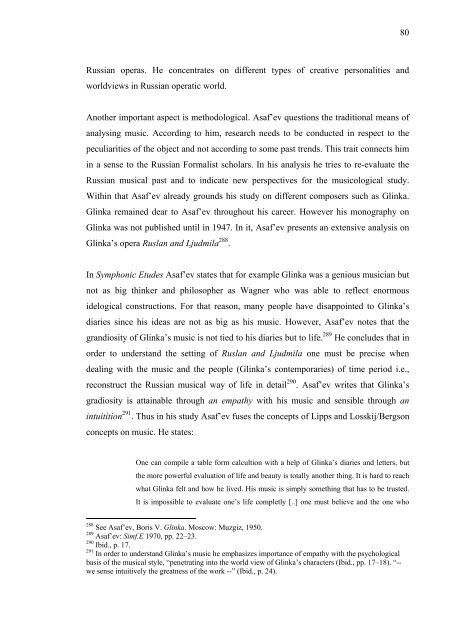Boris Asaf'ev and the Soviet Musicology - E-thesis
Boris Asaf'ev and the Soviet Musicology - E-thesis
Boris Asaf'ev and the Soviet Musicology - E-thesis
You also want an ePaper? Increase the reach of your titles
YUMPU automatically turns print PDFs into web optimized ePapers that Google loves.
Russian operas. He concentrates on different types of creative personalities <strong>and</strong><br />
worldviews in Russian operatic world.<br />
Ano<strong>the</strong>r important aspect is methodological. Asaf’ev questions <strong>the</strong> traditional means of<br />
analysing music. According to him, research needs to be conducted in respect to <strong>the</strong><br />
peculiarities of <strong>the</strong> object <strong>and</strong> not according to some past trends. This trait connects him<br />
in a sense to <strong>the</strong> Russian Formalist scholars. In his analysis he tries to re-evaluate <strong>the</strong><br />
Russian musical past <strong>and</strong> to indicate new perspectives for <strong>the</strong> musicological study.<br />
Within that Asaf’ev already grounds his study on different composers such as Glinka.<br />
Glinka remained dear to Asaf’ev throughout his career. However his monography on<br />
Glinka was not published until in 1947. In it, Asaf’ev presents an extensive analysis on<br />
Glinka’s opera Ruslan <strong>and</strong> Ljudmila 288 .<br />
In Symphonic Etudes Asaf’ev states that for example Glinka was a genious musician but<br />
not as big thinker <strong>and</strong> philosopher as Wagner who was able to reflect enormous<br />
idelogical constructions. For that reason, many people have disappointed to Glinka’s<br />
diaries since his ideas are not as big as his music. However, Asaf’ev notes that <strong>the</strong><br />
gr<strong>and</strong>iosity of Glinka’s music is not tied to his diaries but to life. 289 He concludes that in<br />
order to underst<strong>and</strong> <strong>the</strong> setting of Ruslan <strong>and</strong> Ljudmila one must be precise when<br />
dealing with <strong>the</strong> music <strong>and</strong> <strong>the</strong> people (Glinka’s contemporaries) of time period i.e.,<br />
reconstruct <strong>the</strong> Russian musical way of life in detail 290 . Asaf’ev writes that Glinka’s<br />
gradiosity is attainable through an empathy with his music <strong>and</strong> sensible through an<br />
intuitition 291 . Thus in his study Asaf’ev fuses <strong>the</strong> concepts of Lipps <strong>and</strong> Losskij/Bergson<br />
concepts on music. He states:<br />
One can compile a table form calcultion with a help of Glinka’s diaries <strong>and</strong> letters, but<br />
<strong>the</strong> more powerful evaluation of life <strong>and</strong> beauty is totally ano<strong>the</strong>r thing. It is hard to reach<br />
what Glinka felt <strong>and</strong> how he lived. His music is simply something that has to be trusted.<br />
It is impossible to evaluate one’s life completly [..] one must believe <strong>and</strong> <strong>the</strong> one who<br />
288<br />
See Asaf’ev, <strong>Boris</strong> V. Glinka. Moscow: Muzgiz, 1950.<br />
289<br />
Asaf’ev: Simf.E 1970, pp. 22–23.<br />
290<br />
Ibid., p. 17.<br />
291<br />
In order to underst<strong>and</strong> Glinka’s music he emphasizes importance of empathy with <strong>the</strong> psychological<br />
basis of <strong>the</strong> musical style, “penetrating into <strong>the</strong> world view of Glinka’s characters (Ibid., pp. 17–18). “-we<br />
sense intuitively <strong>the</strong> greatness of <strong>the</strong> work --” (Ibid., p. 24).<br />
80

















